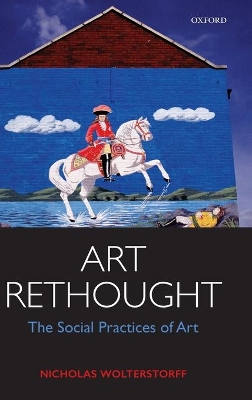Human beings engage works of the arts in many different ways: they sing songs while working, they kiss icons, they create and dedicate memorials. Yet almost all philosophers of art of the modern period have ignored this variety and focused entirely on just one mode of engagement, namely, disinterested attention. In the first part of the book Nicholas Wolterstorff asks why philosophers have concentrated on just this one mode of engagement. The answer he proposes is
that almost all philosophers have accepted what the author calls the grand narrative concerning art in the modern world. It is generally agreed that in the early modern period, members of the middle class in Western Europe increasingly engaged works of the arts as objects of disinterested attention.
The grand narrative claims that this change represented the arts coming into their own, and that works of art, so engaged, are socially other and transcendent. Wolterstorff argues that the grand narrative has to be rejected as not fitting the facts.
Wolterstorff then offers an alternative framework for thinking about the arts. Central to the alternative framework that he proposes are the idea of the arts as social practices and the idea of works of the arts as having different meaning in different practices. He goes on to use this framework to analyse in some detail five distinct social practices of art and the meaning that works have within those practices: the practice of memorial art, of art for veneration, of social protest art, of
works songs, and of recent art-reflexive art.
- ISBN10 0198747756
- ISBN13 9780198747758
- Publish Date 10 September 2015
- Publish Status Active
- Publish Country GB
- Imprint Oxford University Press
- Format Hardcover
- Pages 352
- Language English
